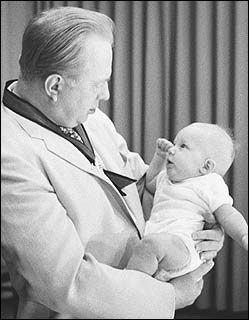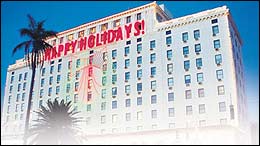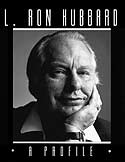
 Love and
Help Children
Love and
Help Children
by L. Ron Hubbard
The Way to Happiness is a common-sense
guide to better living. A testimony to the regard in which he held men of goodwill,
no matter their faith, L. Ron Hubbard wrote this moral code for use by adults
and children of all faiths.
It contains 21 precepts for successful living
in a modern world. The following, Precept 4, is included here; others will be
published in future editions of Freedom.
Today's children will become tomorrow's civilization. Bringing a child into
the world today is a little bit like dropping one into a tiger's cage. Children
can't handle their environment and they have no real resources. They need love
and help to make it.
It is a delicate problem to discuss. There are almost as many theories on how
to raise a child or not raise him as there are parents. Yet if one does it incorrectly
much grief can result and one may even complicate his or her own later years.
Some try to raise children the way they were themselves raised, others attempt
the exact opposite, many hold to an idea that children should be let grow on their
own. None of these guarantee success. The last method is based on a materialistic
idea that the development of the child parallels the evolutionary history of the
race; that in some magical way, unexplained, the "nerves" of the child will "ripen"
as he or she grows older and the result will be a moral, well-behaving adult.
Although the theory is disproven with ease — simply by noticing the large criminal
population whose nerves somehow did not ripen — it is a lazy way to raise children
and achieves some popularity. It doesn't take care of your civilization's future
or your older years.
A child is a little bit like a blank slate. If you write the wrong things on
it, it will say the wrong things. But, unlike a slate, a child can begin to do
the writing: the child tends to write what has been written already. The problem
is complicated by the fact that, while most children are capable of great decency,
a few are born insane and today, some are even born as drug addicts: but such
cases are an unusual few.
It does no good just to try to "buy" the child with an overwhelm of toys and
possessions or to smother and protect the child: the result can be pretty awful.
One has to make up his mind what he is trying to get the child to become. This
is modified by several things: a) what the child basically can become due to inherent
makeup and potential; b) what the child, himself, really wants to become; c) what
one wants the child to become; d) the resources available. But remember that whatever
these all add up to, the child will not survive well unless he or she eventually
becomes self-reliant and very moral. Otherwise the end product is likely to be
a liability to everyone including the child.
Whatever is one's affection for the child, remember that the child cannot survive
well in the long run if he or she does not have his or her feet put on the way
to survival. It will be no accident if the child goes wrong: the contemporary
society is tailor-made for a child's failure.
It will help enormously if you obtain a child's understanding of and agreement
to follow the precepts contained in this book.
What does have a workability is simply to try to be the child's friend. It
is certainly true that a child needs friends. Try to find out what a child's problem
really is and without crushing their own solutions, try to help solve them. Observe
them — and this applies even to babies. Listen to what children tell you about
their lives. Let them help — if you don't, they become overwhelmed with a sense
of obligation which they then must repress.
It will help the child enormously if you obtain understanding of and agreement
to this way to happiness and get him or her to follow it. It could have an enormous
effect on the child's survival — and yours.
A child factually does not do well without love. Most children have an abundance
of it to return.
The way to happiness has on its route the loving and the helping of children
from babyhood to the brink of adult life.
 |
|
L. Ron Hubbard
|

You Are Always Welcome The Church of Scientology has restored several of Clearwater's signature buildings,
including the Fort Harrison Hotel, the Clearwater Bank Building and the Coachman
Building. The buildings, constructed in the early 20th century, have been returned
to their original, stately presence downtown.
Facilities of the Fort Harrison and the Clearwater Building are available
and used routinely by residents and community groups for banquets, proms, conferences,
exhibits and performances.
In recognition of the 76th anniversary of the Fort Harrison as a historical
landmark in Clearwater, the Church of Scientology will be holding four weeks of
open house, tours and special events from January 19 to February 16, 2003. The
regular "Sunday at the Fort Harrison" open houses will resume after February 16.
To schedule your meetings or functions, or to use
exhibition space or simply come for a tour, contact Lisa Cook at (727) 467-6860.
|
|
L. Ron Hubbard:
A PROFILE
 The 130-page L. Ron Hubbard: A Profile chronicles the life and accomplishments of the founder of the Scientology religion, and the impact of his life’s work on millions of people the world over.
The 130-page L. Ron Hubbard: A Profile chronicles the life and accomplishments of the founder of the Scientology religion, and the impact of his life’s work on millions of people the world over.
Profile provides the best description yet of the man and his works, including professional accomplishments in many fields — writer, barnstorming pilot, explorer, musician, Marine Corps drill sergeant, Naval intelligence officer, photographer, press reporter, special officer of the Los Angeles Police Department, horticulturist, master mariner, and more. It profiles a man who was well beyond superficial classification.
To purchase a copy of L. Ron Hubbard: A Profile, write to:
Church of Scientology
503 Cleveland St.
Clearwater, FL 33755
Complimentary copies are available to religious leaders, government officials
and members of the news media at this address.
You can also visit: www.lronhubbard.org
|

